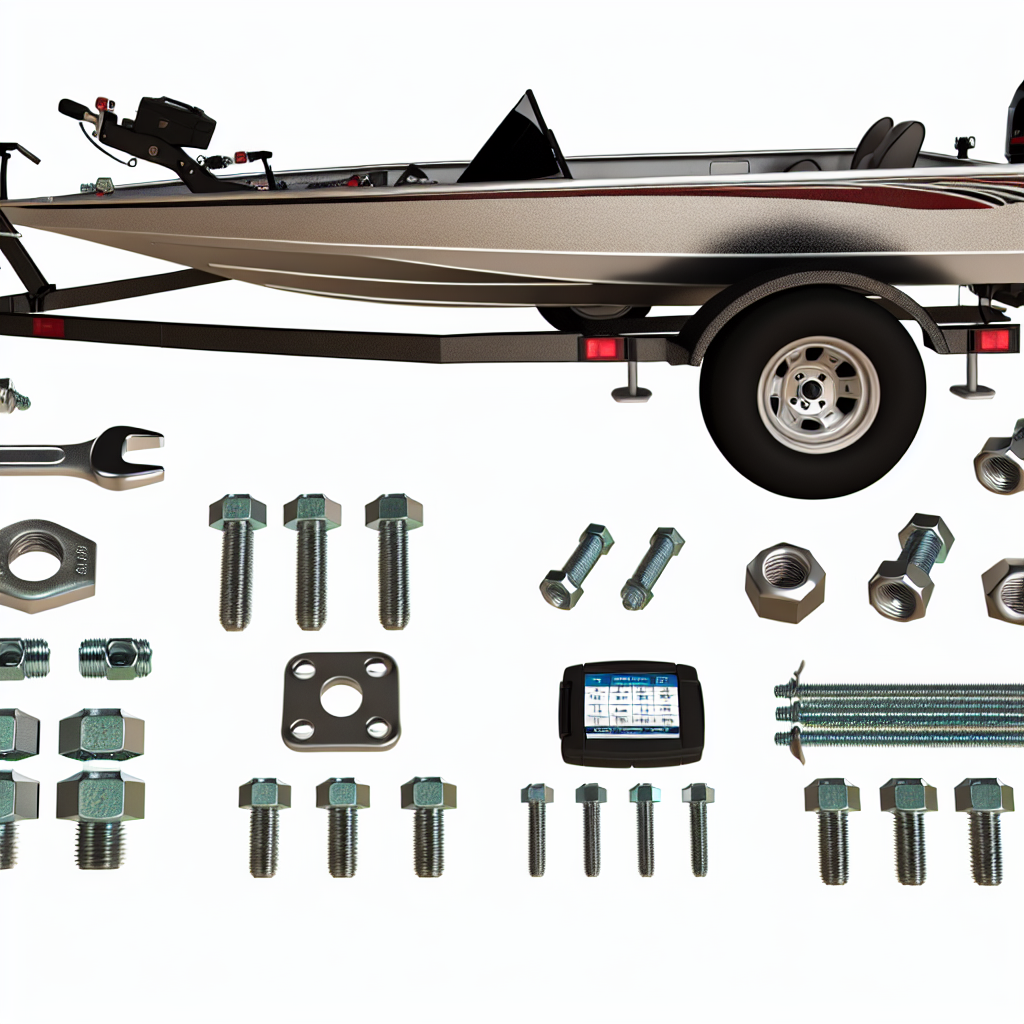Introduction to Bolts for Bass Boat Trailer Runners
A. Overview of Bass Boat Trailer Runners
Bass boat trailers are designed with runners that keep the boat stable during transportation. Bolts play a critical role in securing these runners to the trailer frame.
B. Importance of the Correct Bolt Size
Choosing the right bolt size is essential to ensure that the runners stay securely attached to the trailer during transportation. Using incorrect bolt sizes can lead to the runners coming loose or, even worse, the boat detaching from the trailer.
Here are some key takeaways for understanding bolts for bass boat trailer runners:
- Bolt sizes play a critical role in securing the runners to the trailer frame.
- Using incorrect bolt sizes can lead to the runners coming loose, which can be dangerous and costly.
Understanding Bolt Sizes: What Size Bolts for Bass Boat Trailer Runners?
When it comes to bass boat trailer runners, having the correct bolt size is crucial for both safety and performance. But how do you know what size bolts to use? In this section, we’ll explore the standard bolt sizes for bass boat trailer runners, how to measure bolt size, and the implications of using incorrect bolt sizes.
Standard Bolt Sizes for Bass Boat Trailer Runners
The most common bolt sizes for bass boat trailer runners are 1/2 inch and 5/8 inch. However, it’s essential to check your specific trailer’s manual to confirm the recommended bolt size. Using the incorrect bolt size can lead to severe consequences, including trailer failure and accidents.
How to Measure Bolt Size
To determine the size of your bolt, you need to measure the diameter of the shank, or the smooth part that sits between the threads and the head. You can use a caliper to get an accurate measurement. Remember that measuring the threads will not give you an accurate bolt size.
Implications of Using Incorrect Bolt Sizes
Using the wrong bolt size can lead to several issues, including improper weight distribution, decreased trailer stability, and trailer failure. If the bolt is too small, it may not be able to handle the load, while a bolt that’s too large can create an uneven distribution of weight. Additionally, an incorrect bolt size can cause the bolt to break or loosen, posing a real safety risk.
It’s essential to ensure that you’re using the correct bolt size for your specific trailer to avoid any potential problems.
In conclusion, using the correct bolt size is a critical consideration when it comes to bass boat trailer runners. Understanding the standard sizes, measuring the bolt size, and knowing the implications of using the wrong size can make all the difference in preventing accidents and ensuring optimal performance.
Step-by-Step Guide on Replacing or Installing Bolts on Your Bass Boat Trailer
Whether you need to replace worn-out bolts or install new ones, the process is fairly straightforward. Following this step-by-step guide will ensure that your bolts are safely and securely installed on your bass boat trailer.
A. Tools Needed for Installation
- Socket Wrench
- Wrench Set
- Torque Wrench
- Screwdriver
- Bolts (of the correct size and material)
B. Preparing for Installation
- Gather all necessary tools and materials listed above.
- Position your bass boat trailer for easy access to the bolts you need to replace or install.
- Clean the area around the bolts and make sure it is dry; this will help ensure a tight fit.
C. Installation Process
- Using a socket wrench, remove the old bolts you need to replace and set them aside.
- If necessary, clean the threads on the bolt holes using a wire brush or compressed air.
- Insert the new bolts and hand-tighten them until they are snug against the trailer frame.
- Using a torque wrench, tighten each bolt to the manufacturer’s recommended specification.
- After tightening, check each bolt again to confirm that it is secure and properly tightened.
D. Safety Guidelines
When replacing or installing bolts on your bass boat trailer, it is important to follow these safety guidelines to ensure a safe and successful outcome:
- Always use the correct size and material of bolt for your trailer.
- Wear eye protection to prevent any debris from entering your eyes.
- Use proper lifting techniques and equipment to avoid injury from lifting heavy objects.
- Never attempt to work underneath your trailer without properly supporting it with sturdy jack stands or blocks.
By following this step-by-step guide, you can replace or install bolts on your bass boat trailer safely and securely. Remember to always use the correct bolt size and material, and follow proper safety guidelines to avoid injury or damage.
Tips for Maintaining the Bolts on Your Bass Boat Trailer
As a bass boat owner, you know how important it is to make sure everything on your trailer is in good working condition. Bolts are no exception, and proper maintenance is essential. Here are some tips for keeping your bolts in top shape:
A. Regular Inspection and Maintenance
- Inspect your bolts frequently for signs of wear and tear, such as rust or corrosion
- Replace any damaged or worn bolts immediately
- Keep your bolts clean and free of debris by wiping them down regularly
B. Common Signs of Bolt Wear and Tear
- Rust or corrosion on the bolts
- Loose bolts
- Bolts that are stripped or damaged
C. When and How to Replace Bolts
- If you notice any signs of wear and tear, it’s important to replace your bolts as soon as possible to minimize the risk of damage to your boat
- Make sure to choose the correct size and material when replacing your bolts
- Use a torque wrench to ensure that your bolts are tightened to the correct specifications
Key Takeaways:
- Regular inspection and maintenance are key to keeping your bolts in good condition
- Signs of wear and tear include rust or corrosion, loose bolts, and stripped or damaged bolts
- If you need to replace your bolts, make sure to choose the correct size and material and use a torque wrench to tighten them properly
| Frequently Asked Questions |
|---|
| Q: How often should I inspect my bolts? |
| A: It’s a good idea to inspect your bolts before and after each use, as well as during regular maintenance checks. |
| Q: Can I use any type of bolts for my bass boat trailer runners? |
| A: No, it’s important to use the correct size and material of bolts for your specific trailer runners. Refer to the manufacturer’s instructions or consult with a professional if you’re unsure. |
| Q: How tight should my bolts be? |
| A: Your bolts should be tightened to the manufacturer’s specifications, which can usually be found in the user manual or online. |
| Q: What should I do if I notice signs of wear and tear on my bolts? |
| A: Replace the damaged bolts as soon as possible to prevent further damage to your boat and trailer. |


